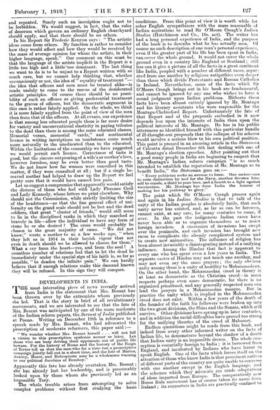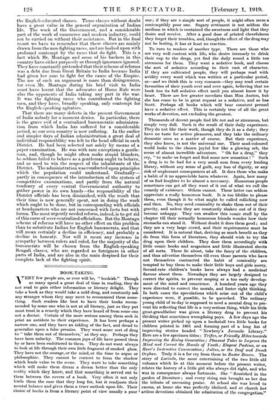DEVELOPMENTS IN INDIA.
THE most interesting piece of news recently arrived
from India is the statement that Mrs. Besant has been thrown over by the extremists whom previously she led. That is the story in brief of all revolutionary movements, and we are interested to see that the fate of Mrs. Besant was anticipated by one of the more moderate of the Indian reform papers, the Servant of India published at Poona. Writing on December 19th in reference to a speech made by Mrs. Besant, who had advocated the proscription of moderate reformers, this paper said :-
" We wonder whether Mrs. Besant herself . . . will not fall a victim to this proscription epidemic sooner or later. Let those who are busy driving their opponents out of public life beware. For the history of Rome and the history of the Reign of Terror tell us that the men who for a time run a proscriptive campaignjointly fall out in a short time, and the fate of Marius, Antony, Marat, and Robespierre may be a wholesome warning to our political Jacobins of Bombay.',
Apparently this fate has already overtaken Mrs. Besant ; she has already lost her leadership, and is presumably looked upon by those whom she previously led as an impossible Tory. The whole trouble arises from attempting to solve complex problems without first studying the basic
conditions. From this point of view it is worth while for sober English sympathizers with the more reasonable of Indian aspirations to read Sir O'Moore Creagh's Indian Studies (Hutchinson and Co., 16s. net). The writer has had a long personal experience of India, and the purpose of the book is to describe what he has actually seen. Of course no such description of one man's personal experience, even if the greater part of his life has been spent in India, can cover the whole ground. It would not cover the whole ground even in a country like England or Scotland ; still less can it give a picture of all the facts in a great continent like India, peopled with a number of different races, separ- ated from one another by religious antipathies even deeper than those which divide Protestants and Roman Catholics in Ireland. Nevertheless, some of the facts which Six O'Moore Creagh brings out in his book are fundamental, and cannot be ignored by any one who wishes to form a sound judgment upon Indian problems. Hitherto these facts have been almost entirely ignored by Mr. Montagu and his literary assistants who were responsible for the Montagu-Chelmsford Report. Unfortunately the fate of that Report and of the proposals embodied in it now depends less upon the interests of India than upon the political interests of Mr. Montagu. He has in his public utterances so identified himself with this particular bundle of ill-thought-out proposals that the collapse of his scheme would involve a serious blow to his own political position. This point is pressed in an amusing article in the Statesman of Calcutta dated December 6th last dealing with one of Mr. Montagu's election speeches. After pointing out that a good many people in India are beginning to suspect that Mr. Montagu 's Indian reform campaign " is as much intended to establish the reputation of Mr. Montagu as to benefit India," the Statesman goes on :- " Every politician seeks an avenue to fame. One endeavours to earn distinction by seal for the Navy, another devotes him- self to canals, a third to pure beer, and a fourth to a fight against vaccination. Mr. Montagu has done India the honour of making her his pathway to glory."
The point which Sir O'Moore Creagh presses again and again in his Indian Studies is that to talk of the unity of the Indian peoples is absolutely futile, that ouch unity never has existed, and, as far as can be foreseen, cannot exist, at any rate, for many centuries to come, if ever. In the past the indigenous Indian races have never been able so to organize themselves as to resist foreign invaders. A succession of invasions has swept over the peninsula, and each invasion has brought new races to complicate the already complicated system and to create new animosities. The influence of religion has been almost invariably a disintegrating instead of a unifying influence. Among the Hindus that fact is apparent to every one who has spent even a few years in India. The separate castes of Hindus may not touch one another, and may not even say the same Foyers ; the only obvious unity among them is a unity of hostility to Mohammedans. On the other hand, the Mohammedan creed in theory is at least as democratic as the Christian creed—in some respects perhaps even more democratic, for there is no organized priesthood, and any generally respected man can lead the prayers in a Mohammedan mosque. But in practice the unity which is implied in the Mohammedan creed does not exist. Within a few years of the death of the founder of the faith his followers were broken up into the two great divisions, the Shies and the Sunnis, which still survive. Other divisions have sprung up in later centuries, and in addition the racial difficulties have proved too strong for the unifying theories of the creed of Mehemet. Endless quotations might be made from this book, and indeed from every other informed writer on the facts of Indian life, to demonstrate beyond the shadow of a doubt that Indian unity is an impossible dream. The whole con- ception is essentially foreign to India ; it is borrowed from England, and inculcated by Indians who have learnt to speak English. One of the facts which forces itself on the attention of those who know India is that prominent natives of different parts of the country are quite unable to convenes with one another except in the English language, and the schemes which they advocate are crude adaptations of ideas imported from Europe. The comparatively new Home Rule movement has of course taken its name from Ireland ; its supporters in India are practically confined to
the English-educated classes. Those classes without doubt have a great value in the general organization of Indian life. The work of the Government, and a considerable part of the work of commerce and modern industry, could not be carried on without their assistance. But in the final resort we have to remember that these classes are mainly drawn from the non-fighting races, and are looked upon with profound contempt by the races that do fight. This is a fact which Mr. Montagu and sonic of his backers in this country have either purposelv or through ignorance ignored. They have constantly pretended that their scheme of reforms was a debt due from Great Britain to India because India had given her sons to fight for the cause of the Empire. The use of such an argument is more than disingenuous, for even Mr. Montagu during his brief visit to India must have learnt that the advocates of Home Rule were also the opponents of India taking any part in the war. It was the fighting races who contributed the fighting men, and they have, broadly speaking, only contempt for the English-speaking agitators.
That there are many defects in the present Government of India nobody for a moment denies. In particular, there is the grave evil of a centralized bureaucratic administra- tion from which India has suffered for a considerable period, as our own country is now suffering. In the earlier and simpler days of Indian administration a great deal of individual responsibility was left to the head official in each District. He had been selected not solely by means of a paper examination. He was with rare exceptions a gentle- man, and, though he might often make stupid blunders, he seldom failed to behave as a gentleman ought to behave, and so used to win the respect of the inhabitants of the District. The administration was conducted upon principles which the population could understand. Gradually— partly in consequence of the introduction of the system of competitive examinations, and partly from the natural tendency of every central Governmental authority to gather power in its own hands—the responsibility of the District officials has been diminished, with the result that their time is now generally spent, not in doing the work which ought to be done, but in corresponding with officials at headquarters who are not concerned with facts but with forms. The most urgently needed reform, indeed, is to get rid of this curse of over-centralized officialism. But the Montagu scheme of reforms will have no other effect on this problem than to substitute Indian for English bureaucrats, and that will mean certainly a decline in efficiency, and probably a
decline in honesty. N i or will it mean any increase in sympathy between rulers and ruled, for the majority of the bureaucrats will be chosen from the English-speaking Bengali classes, who are regarded as foreigners in other parts of India, and are also in the main despised for their complete lack of the fighting spirit.



































 Previous page
Previous page